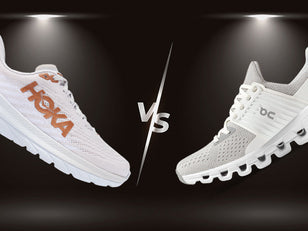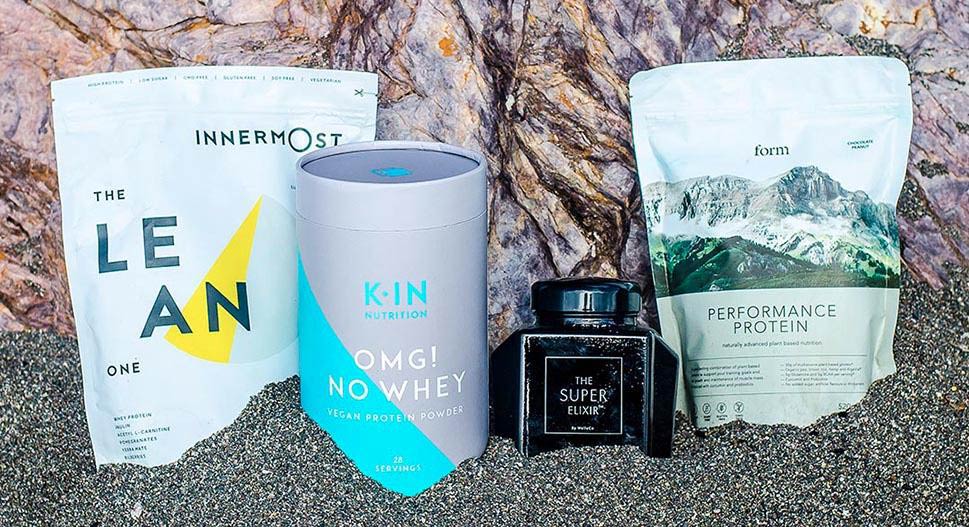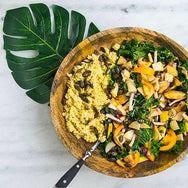Why is protein so important?
Protein is incredibly important. If we don’t eat enough from the diet our health and body composition suffers. Proteins are the main building blocks of life and every living cell in the body uses them for both structural and functional purposes.
Proteins also help balance blood sugars, vital for weight management. Proteins are made out of smaller molecules called amino acids:
- Amino acids link together a little a lego
- Amino acids produced by your body are called non-essential amino acids
- Those that you cannot produce are called essential amino acids. You must get these from your diet
- Animal sources of protein tend to deliver all the amino acids we need to make new protein, however plant proteins don’t
- If you are vegetarian or vegan, it is important that your diet contains a wide variety of plant based foods
What protein supplements are out there?
Protein supplements can be broadly classified according to their nutrient profile, with the most common ones as follows:
- Protein only - a single protein source
- Protein blend - a combination of several proteins
- Combination - protein combined with additional ingredients, such carbohydrates, creatine, specific amino acids and/or vitamins and minerals
- Plant proteins - such as pea, rice, soy or hemp
What is whey protein?
Whey is a by-product of cheese manufacturing. It provides all nine essential amino acids and is rapidly digested and absorbed into the bloodstream meaning it reaches muscles quickly. Whey is one of the most researched sports nutrition supplements out there.
What are the main types of whey protein?
There are 3 main forms:
- Whey Protein Concentrate (WPC) – Typically 70-80% protein by weight with small amounts of lactose (milk sugar) and fat. Cheaper than whey protein isolate
- Whey Protein Isolate (WPI) – Powder is usually 90% protein by weight, with negligible amounts of carbohydrates (lactose) and fat
- Whey Protein Hydrolysate (WPH) – Derived from whey protein concentrate or isolate it is known for its shorter peptides or amino acid chains, supposedly resulting in even more rapid digestion, but evidence to date is conflicting.
For most us, what’s really important is to get the total protein intake and timing of supplement (no matter if it’s a “concentrate”, “isolate” or “hydrolysate”) right.
What is casein protein powder?
Like whey, casein protein comes from dairy and is actually the primary protein found in cow’s milk. Unlike whey protein, however, it digests slower due to a complex interaction with stomach acids.
This results in a slower absorption of essential proteins and amino acids, which makes casein the preferred supplement in situations when a slow release of nutrients is beneficial (such as before bed, when you’re going seven to 8 - 10 hours without food).
How about plant protein powders?
The most common sources of vegan protein are soy, pea, brown rice and hemp formulas or more commonly now, a combination of more than one source of plant protein.
As these proteins are completely plant based, they are suitable for vegans. Plant protein powders (with exception to soy) are also looked upon as being hypoallergenic and easy to digest as they are lactose and gluten free.
Although these proteins are easier to digest, a key issue with plant proteins is that they lack some amino acids. For example, pea protein is deficient in cysteine and both hemp and brown rice protein are deficient in lysine.
It is therefore very important to ensure that you are consuming a combination of the plant proteins as this would deliver a complete protein source.
So which protein powder is best for you?
Whether you’re looking to build muscle or lose fat, there is a protein for you. Here are some things to consider when choosing your protein powder:
1. Amino Acid Profile
The nutritional value of a protein is determined by its unique amino acid profile and whether the protein contains all nine essential amino acids.
Whey for example has the highest biological value (HBV) as it contains all of the essential amino acids needed by the body. This is essential for muscle function and repair.
Plant based proteins only contain only some of the essential amino acids and are considered to be of lower biological value. However, if you use a combination of plant proteins (such as brown rice and pea protein) you will get all the amino acids found in whey.
Research has found that as long as people eat enough total protein (plant or animal), the source of protein doesn’t matter.
Leucine, a branched chain amino-acid, plays a critical role in ‘switching on’ muscle protein synthesis. The leucine content of foods varies but some foods are naturally high in leucine, including milk (and therefore whey protein) and red meat.
Research suggests that ~2-3g of leucine maximally stimulates protein synthesis (equivalent to ~20-25g of HBV protein). Plant based protein also contain lower amounts of leucine, however this is not a difficult hurdle to overcome.
Plant proteins can still provide you with all the essential amino acids (including leucine) if you eat them in sufficient quantity and/or combined with more than one source.
Whey also contains special molecules called immunoglobulins that stimulate immune function. It also has higher amounts of the amino acid cysteine which is the key precursor to glutathione, a powerful detoxifier and antioxidant.
Pea protein in contrast has been shown to be deficient in cysteine. However antioxidants can also be found in other fruit and vegetables.
2. Digestibility
Whey contains lactose, which can cause some digestive issues in people who are intolerant. Some people may also be allergic to milk proteins. Both intolerance and allergic reactions to whey produce various symptoms such as digestive discomfort (bloating, pain diarrhoea) and lethargy.
Plant based proteins are lactose free and therefore offer a hypo-allergenic alternative. Whey isolate also contains very low amounts of lactose.
3. Sustainability
There is currently a lot of focus on sustainable eating. Utilising plant-based proteins instead of animal proteins is the more sustainable option in the long term, however sustainable eating is not about single food choices but a wider lifestyle.
4. Taste
Ultimately, taste preferences depend on the individual, but it’s important to like the taste of your protein powder! Consider how you will be using the powder (i.e. will you drink it as a shake on its own or add it to foods/ smoothies), as that will guide what flavours you choose.
So... Whey or plant-based protein?
Which do you choose, Whey or plant-based protein? Ultimately the decision is yours. You may have to weigh up your budget, your taste preference and how your body digests either protein, but you don’t have to weigh up the results. Fortunately both have been proven to be effective in building muscle and aiding muscular recovery.
Check out our Nutrition Collection, for the best whey, gluten-free and vegan options on the market.
Linia Patel investigates: do I need to take protein supplements after exercise?





























































